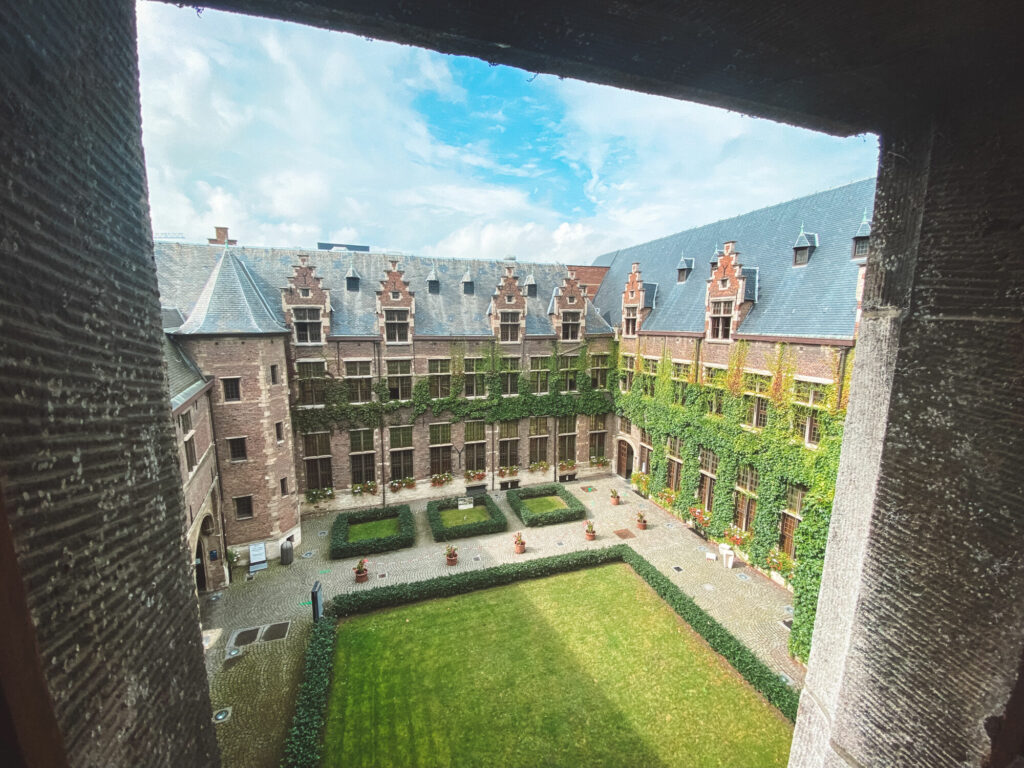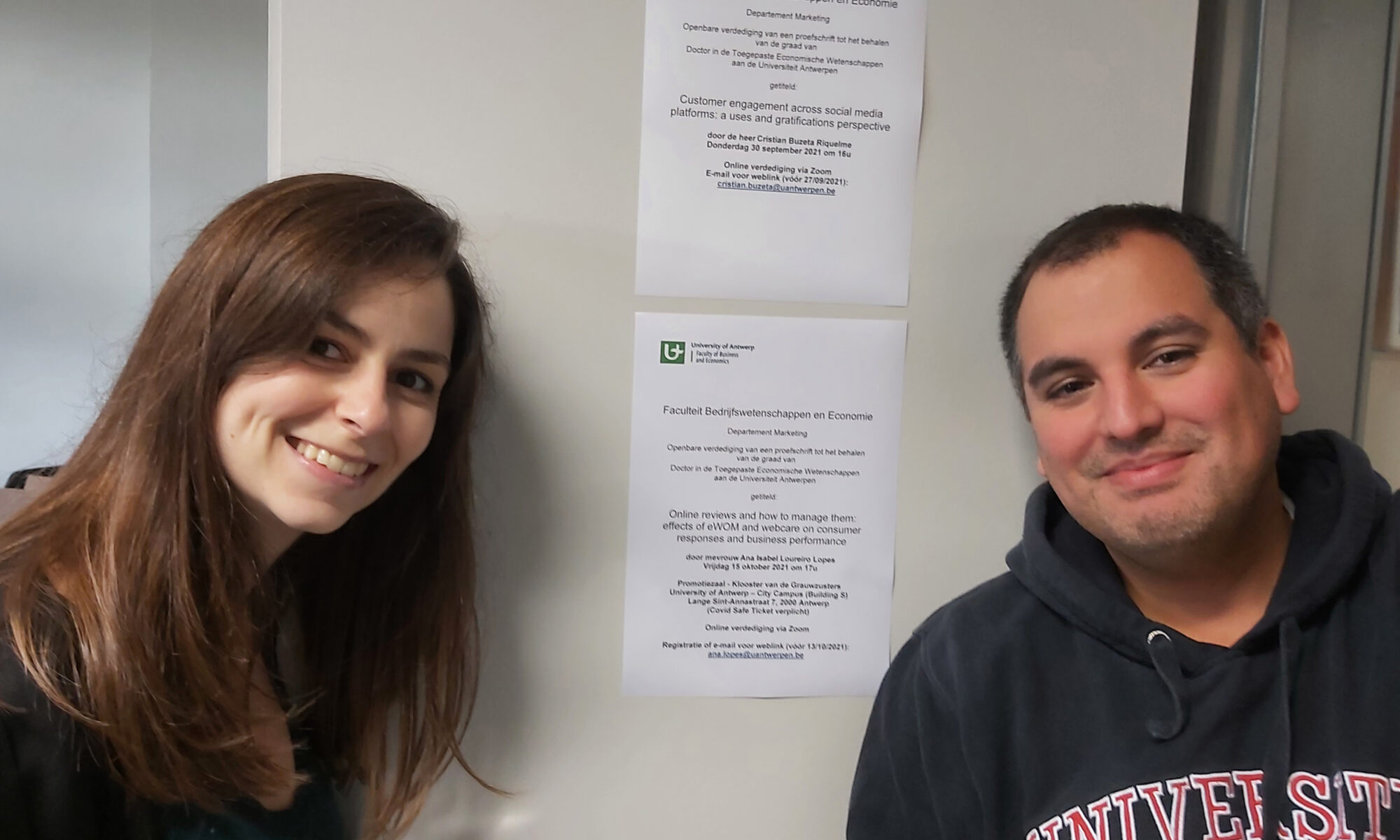After four years of PhD training, Ana and Cristian publicly defended their doctoral theses a few weeks ago. With only three months of difference on their starting dates, they had a common passion for Marketing communications and their role in nowadays’ digital brand communications. Nevertheless, they also shared supervisors, an office, and the difficulties and joys of a long-lasting doctoral endeavor. Here, they discuss some of their thoughts about the implications of coming to Belgium for a PhD, the language challenge, and the need to develop a strong collaboration team.
“Why Belgium?” Why not!?
Across our doctoral years, we got used to getting a very straightforward question from the people we met in conferences and other places: “why did you decide to go to Belgium to do a PhD?” Indeed, both of us are non-Belgian. Indeed, we had zero connections with researchers in this part of Europe. Moreover, before moving to Antwerp in the company of our own families, we had barely visited the country for only a few days. Compared to our countries of origin (Ana comes from Portugal and Cristian from Chile), the sky in Belgium is clouded (almost) every day, and the temperature is way different.
Both of us wanted something “different”
It would be honest to say that while we knew the University of Antwerp was a good place to work as a researcher – particularly in the case of the research group that hosted us – we had very little knowledge prior to our arrival to Belgium about what to expect from four years of doctoral training in this country. What is more, we quickly discovered that coming to Belgium would not be absent of challenges and difficulties.
However, we found ways to make good progress every day, mainly because we had strong support at home, the best of our families’ company, and an excellent (and very challenging) group of colleagues. As for the last point, at the office (and before the pandemic started), we had an open office policy, and we made good use of that policy! The fruitful discussions with colleagues about ideas, methods, failures, and successes were frequent, as were the talks about good restaurants, what we had for dinner last night, or any other trivial issue (but mostly related to food…), making our days much lighter and brighter. Similar to any other work, having friendly and nice people around us at the office makes everything easier.
Four years have passed very fast
It feels like yesterday that we arrived at what would be one of the most challenging and exciting periods of our lives. Those reading this who want to pursue a PhD but are afraid because of all the stories about terrible supervisors, awful conditions, and flawed work environment: it DOES NOT have to be like that! There are places where PhD students can thrive and live happily despite the challenges of doctoral work. The University of Antwerp, the Faculty of Business and Economics (FBE), and the Department of Marketing are among those places!
Languages challenge as a foreign doctoral student
Belgium in general, and the city of Antwerp in particular, is highly multicultural, which is different from to our home countries. The diversity of people with different viewpoints, languages, and stories was enriching. Nevertheless, as foreigners there were barriers to overcome. Suddenly, we had to adapt to a new social environment that mainly spoke Flemish. At the same time, we had to improve our language skills to communicate and research effectively in English. Unlike what happens in our home countries, working every day in a non-native language is a reality here in Belgium. Thus, we decided to embrace that reality. That was the first difference.
We shared office S.B.237 in the building of the FBE. Because of our backgrounds, both of us could communicate (more or less well) in Portuguese and Spanish. So, it would not surprise anyone if we wanted to speak “Portuñol” at work. However, we decided that English was going to be our working language. This definition helped us enter into a specific mood at the office, while also was good to improve our confidence in talking and chatting in another language. Also, it helped us a lot to integrate better our colleagues that came in into our office.

In the old days (with no COVID-19), our room was always full of people who passed by to share some ideas, ask a question, talk about a new trend, or have a quick talk about life and cats (and food…). Considering that our research group was composed of people from different countries, it was an excellent way to make everyone feel welcome. Based on the good relationships we were able to develop during our doctoral years, we think this decision to base our communication mainly on English was very successful.
Individual agendas achieved by joint efforts
It is pretty common to hear that academics’ life tends to be rather solitary. Even though we do collaborate with other colleagues, it is not uncommon to predominantly research our own research lines. Thus, each researcher tends to have an individual agenda of research. That is particularly the case when PhD students are assigned to specific research projects. In our case, Ana’s PhD project was related to online consumers’ reviews and electronic word of mouth (eWOM), while Cristian’s doctoral work was related to customer engagement across different social media platforms. The same pair of promoters supervised these two different doctoral projects. Nevertheless, their nature and motivation were different, as well as their research approach and methods involved.
However, although we did not investigate the same topic, we were challenged by similar problems and issues at similar moments of our doctoral training. In the first year, we both had the same course structure (Research Methods and Advanced Marketing). Therefore, for several of the assignments, we collaborated by providing feedback to each other. Because of the assignments’ characteristics, this feedback resulted in something very valuable. It gave us, for instance, the chance to practice how to defend our ideas in front of an audience. Later in the doctoral training path, we also obtained help from the PhD Club that existed in our department. The central moral here is that tackling these challenges as a team was much better than doing it alone and all by ourselves.
We want to stress the idea of shared responsibilities.
Because of the COVID-19 pandemic, it seems very clear now that “we are all in the same boat.” However, this was something important we learned in the old days before the virus. As part of a relatively small research group, there were some opportunities in which each of us had to step up and just volunteer. Things like “who will present at the next PhD club?” were not automatically solved. The main learning was that what is good for you could also benefit your teammates. So, do not be afraid of sharing time, research ideas, job opportunities, calls for papers, calls for funding, and so on. Playing this game as a team endeavor was super fun, as well.
A final word on the value of people
Human relationships are complex by nature. Therefore, it is always a challenge to organize and get used to working with others. But, happily, camaraderie and friendship can always exist even in such complicated environments. Thus, we would also like to stress the need of making good friends during the PhD. We all live victories (paper accepted!) and failures (paper rejected…) during the past four years. It was important to share both with our colleagues. We quickly learned there that the joys were bigger and the ‘pains’ more manageable. We look forward that the people we meet here in Antwerp will remain in our lives after these doctoral years.


